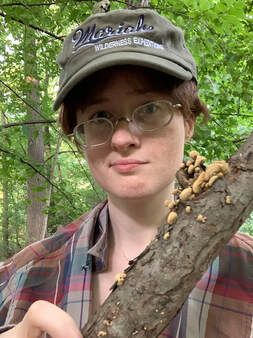
Mariah first studied fungi in-depth during the 'capstone' project of her Biology degree at Ripon College. This was a literature review on bioremediation of hydrocarbons by fungi. In writing that paper, fungi were producers of enzymes capable of biochemically-interesting and ecologically-useful feats to her. She later has gotten know them each by name, in-person on the trail with the Wisconsin Mycological Society.
At the first WMS meeting Mariah attended, Alden Dirks presented on the relative lack of conservation focus on fungi and how community science survey projects can bring fungi out of obscurity and guide our efforts to respect them and support their role in the ecosystem. After that presentation Mariah joined iNaturalist and began documenting the fungi she found.
Mariah joined the board in 2020 after she and her sister, Leah, reached out about using iNaturalist projects and Zoom presentations to remotely connect members of the Society. All WMS projects on iNaturalist are listed here. We have five years of virtual forays now, 2020 - 2021 - 2022 - 2023 - 2024. (If you would like help getting started, please reach out with the WMS contact form or contact Mariah on iNaturalist on through the messages!)
In 2022 Mariah attended the North American Mycological Association's annual foray in Missouri and learned about the Missouri landscape, fungi, and the Missouri Mycological Society. At the foray, she worked as a voucher assistant, helping the team keep the finds coming in organized and supporting the good use of the voucher slips that match each specimen to its records. In 2022 year she also joined the NAMA Arts committee, and has been focusing on the preservation and improvement of the mycological art registry.
In Fall 2024 Mariah will be starting a Masters degree in Mycology at the University of Wisconsin - LaCrosse in the lab of Dr. Arthur Grupe.
Most of all Mariah loves meeting and learning with all her lichenminded trail friends.
At the first WMS meeting Mariah attended, Alden Dirks presented on the relative lack of conservation focus on fungi and how community science survey projects can bring fungi out of obscurity and guide our efforts to respect them and support their role in the ecosystem. After that presentation Mariah joined iNaturalist and began documenting the fungi she found.
Mariah joined the board in 2020 after she and her sister, Leah, reached out about using iNaturalist projects and Zoom presentations to remotely connect members of the Society. All WMS projects on iNaturalist are listed here. We have five years of virtual forays now, 2020 - 2021 - 2022 - 2023 - 2024. (If you would like help getting started, please reach out with the WMS contact form or contact Mariah on iNaturalist on through the messages!)
In 2022 Mariah attended the North American Mycological Association's annual foray in Missouri and learned about the Missouri landscape, fungi, and the Missouri Mycological Society. At the foray, she worked as a voucher assistant, helping the team keep the finds coming in organized and supporting the good use of the voucher slips that match each specimen to its records. In 2022 year she also joined the NAMA Arts committee, and has been focusing on the preservation and improvement of the mycological art registry.
In Fall 2024 Mariah will be starting a Masters degree in Mycology at the University of Wisconsin - LaCrosse in the lab of Dr. Arthur Grupe.
Most of all Mariah loves meeting and learning with all her lichenminded trail friends.
|
If You Suspect a Poisoning
If you suspect you have consumed a poisonous mushroom, contact a physician, the closest hospital ER, poison control center, or dial 911, depending on the severity of the reaction. US Poison Control: 1-800-222-1222 The North American Mycological Association (NAMA) has information that may also be of help. Click here. We do not ID mushrooms through this website.
If you are in need of an ID consider uploading quality photos with multiple views of your specimen and descriptions of your find to Mushroom Observer or iNaturalist including our projects or post in Wild Food Wisconsin or Mushroom Identification Group. If you contact us and provide a way to get back to you, we may be able to provide suggestions for more identification resources you can use. You are always responsible for your own decisions taken on the basis of identification resources. |
Wisconsin Mycological Society (WMS) is dedicated to the study and enjoyment of mushrooms and other fungi throughout the state of Wisconsin. Education, safety, sustainability, community, and connecting with nature are our goals.
|

